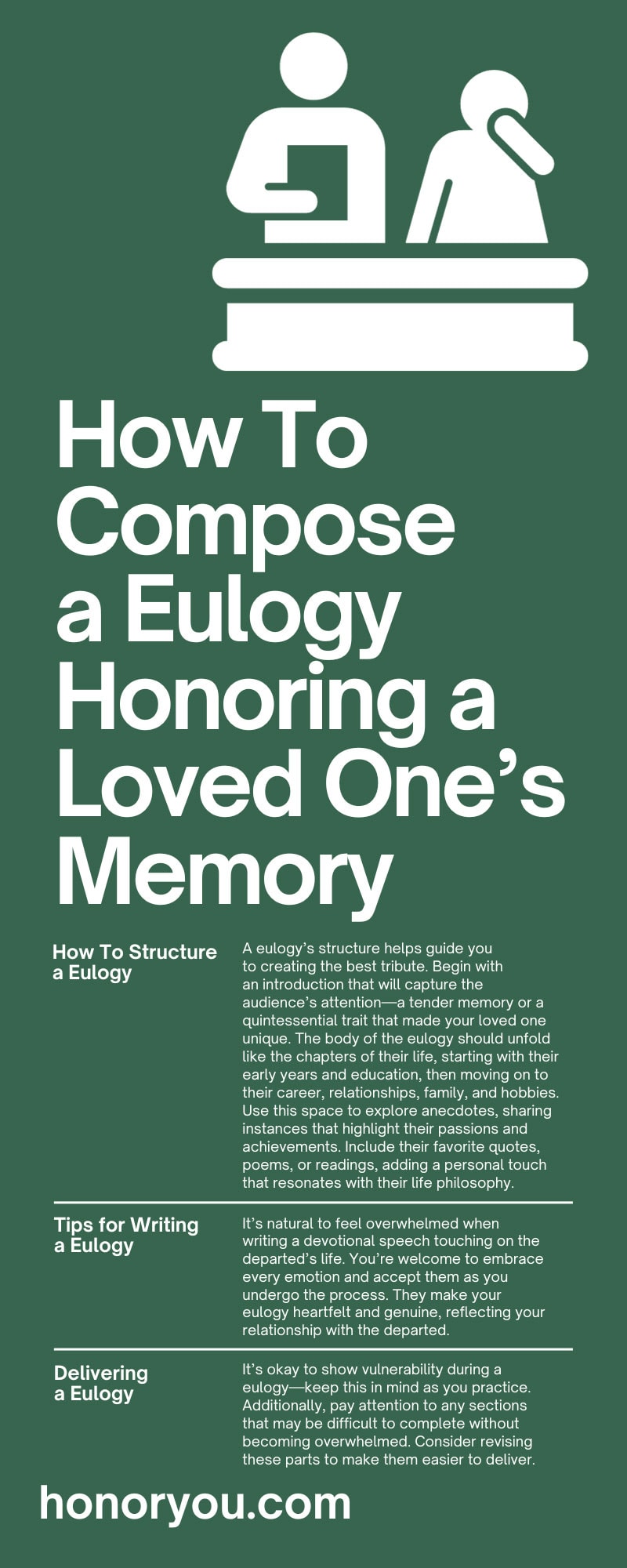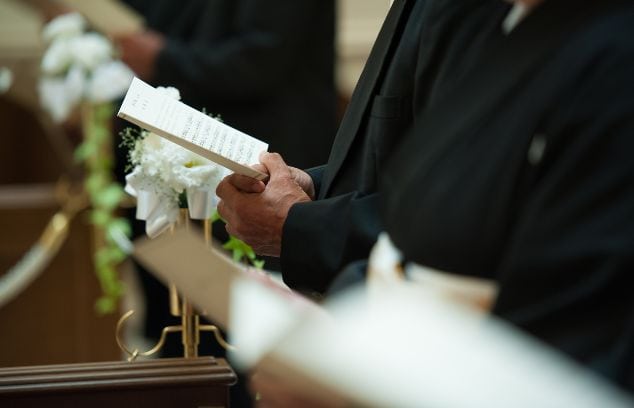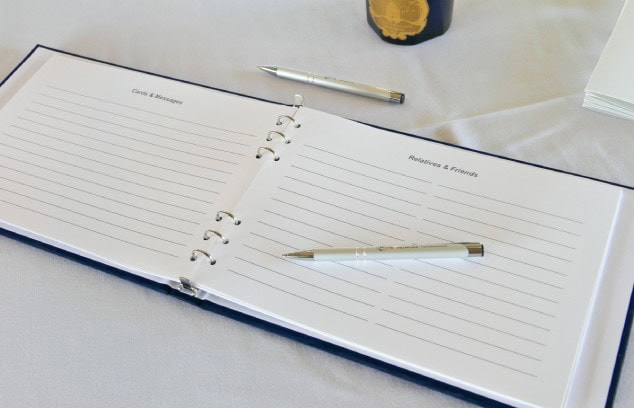How To Compose a Eulogy Honoring a Loved One’s Memory

Grief & Relationships: Nurturing Connections While Mourning
October 23, 2023
Helping Your Child Cope After a Loved One Passes Away
November 3, 2023A eulogy is a testimony to someone’s memory at a funeral. They hold immense power, capturing the essence of a person’s life and presenting it as a final tribute. Honoring a loved one’s memory through a eulogy is a privilege and profound responsibility. They allow us to delve into the loved one’s life journey, sharing personal anecdotes and memories, underscoring their achievements, and highlighting their impact on the lives of others. As we venture into eulogy composition, remember that our love, respect, and admiration for the departed guide our pen. Take a deep breath, step back for a moment, and when you’re ready, begin learning how to compose a eulogy honoring a loved one’s memory.
Why Is Preparing a Eulogy Important?
Crafting a touching eulogy includes more than painting the life canvas of a loved one with flowery language. It’s essential to know that eulogies differ from obituaries. The obituary summarizes a person’s life and announces their passing, while a eulogy is a tribute to the loved one’s life.
So, as you prepare, remember that delivering a eulogy is an act of love and respect that honors someone’s memory.
How To Structure a Eulogy
A eulogy’s structure helps guide you to creating the best tribute. Begin with an introduction that will capture the audience’s attention—a tender memory or a quintessential trait that made your loved one unique. The body of the eulogy should unfold like the chapters of their life, starting with their early years and education, then moving on to their career, relationships, family, and hobbies. Use this space to explore anecdotes, sharing instances that highlight their passions and achievements. Include their favorite quotes, poems, or readings, adding a personal touch that resonates with their life philosophy.
Share Memories
Towards the end, share personal stories that represent their character and values best, using a dash of humor where appropriate to lift the mood. Lastly, express your gratitude, love, and appreciation, acknowledging those who offered support throughout their life. Don’t shy away from saying how much they meant to you and the irreplaceable void they have left behind.
Summarize Your Points
Summarize the key points and weave a heartfelt ending to leave a lasting impression. The conclusion should be a gentle reminder of their legacy, a beacon of their enduring influence. Your words are a testament to their life and a comfort to those left behind.
Tips for Writing a Eulogy
Writing a eulogy is an emotional endeavor. It’s a tribute full of love and sorrow, so you might need some writing tips.
Embrace Your Emotions
It’s natural to feel overwhelmed when writing a devotional speech touching on the departed’s life. You’re welcome to embrace every emotion and accept them as you undergo the process. They make your eulogy heartfelt and genuine, reflecting your relationship with the departed.
Take Your Time
Writing takes time. Sometimes, you might take longer, but that’s all right. Remind yourself that this is not an essay constrained by a grading scale. Allow yourself to feel the emotions that arise, and then, when you’re ready, pen down your thoughts. Remember, it’s okay to take breaks if it gets too overwhelming.
Remember the Purpose
Writing a eulogy is a way to celebrate the life of your loved one. While it’s natural to feel sadness, try to remember the joy, love, and happiness they brought into your life.
Seek Professional Help
Writing a eulogy could become overwhelming as memories rise to the surface. Asking for help from a professional in the mental health field could help you navigate these feelings as you write. They can provide guidance and techniques to help you write as you manage your grief.
There isn’t a right way to craft a eulogy. Participate in activities like painting, reading, and going outside if you need other outlets to process your emotions and help you get creative. You could even incorporate some of your activities into your speech to let others know the connections. Perhaps you paint a bird – adding that into your speech can bring up memories of going to the zoo with your loved one or their fondness for wildlife, particularly birds. Be gentle with yourself during this process. And don’t worry. Your love and respect for the departed will shine through your words, comforting all who hear them.
Delivering a Eulogy
Start by reciting the eulogy aloud in a quiet, comfortable space where you can express your emotions freely. Listen to your voice, the nuances of your tone, and the rhythm of your words. As you navigate the memories and feelings, it’s natural to experience emotional moments. Take your time.
It’s okay to show vulnerability during a eulogy—keep this in mind as you practice. Additionally, pay attention to any sections that may be difficult to complete without becoming overwhelmed. Consider revising these parts to make them easier to deliver.
Gather friends and family to help you practice so they can provide comforting support and constructive feedback. Your eulogy, filled with your love and respect, is a beautiful homage to your loved one’s memory.
Why Practicing Your Eulogy Is Important
Delivering the eulogy is the final step in this deeply personal journey of remembrance. Stand with grace and dignity as you step up to the podium, stage, or at the end of the aisle, mindful of the aura of love, respect, and loss that soaks the atmosphere. Clear your throat, take a deep breath, and remember: your words will serve as a poignant tribute to your loved one’s life and legacy. Speak from the heart, with sincerity and emotion. If the tears come, let them. They are an eloquent testament to your love and grief.
Avoid Rushing
Rushing is one of the worst fears of public speaking, and it’s an even bigger mistake to make when delivering a eulogy. While you have all your thoughts ready to go, you might mistakenly leave large chunks out, leaving the room hazy from stress. Let each word, memory, and sentiment drop like rain that slowly fills a stream. Your listeners support you. It takes time, but don’t falter; pause, collect your thoughts, and continue. Your audience understands the emotional weight of your task and will offer you their silent, unwavering support.
As you conclude, don’t sit right away. Pause a few moments, letting silence spread again, a quiet reverence for the dearly departed. Akin to closing a beloved book, knowing how to compose a eulogy honoring a loved one’s memory is impactful on the lives of those the loved one left behind. Their spirit lives on in your memories, guiding you forward with love and strength. Our Honor You team understands the profound significance of cherishing and honoring a loved one’s memory. Let us assist you in creating a personalized obituary program that encapsulates the departed’s life and legacy. We are committed to crafting a program that tells their unique story.



